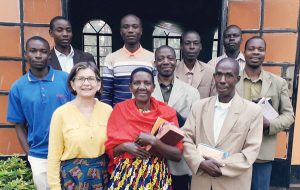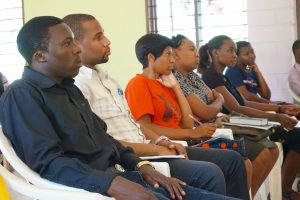Checkpoint Autumn 2022: Understanding culture
In Tanzania, CMS missionary Judith Calf trains pastors and evangelists for the Diocese of Lweru, while fellow missionary Tamie Davis (married to Arthur) serves with Tanzanians who work with university students in Dar es Salaam. Here they give two different perspectives on what ‘discipling’ can mean in the Tanzanian context.
Judith writes:
How culturally bound are our discipleship models and methods? 20 or more years of Tanzanian life and ministry challenges me to ask this question.
Individual and shared discipling
I grew up in the era and culture of the daily quiet time—that regular, personal time of Bible reading and prayer. While I am thankful for this rhythm—and it is still a backbone of my faith life—it emphasises an individual focus that is not common here in Tanzania. When I read the experiences of New Testament household churches, I see a picture of shared faith experience and responsibility, and this is what I encounter in Tanzania. The apostle Paul encouraged the Corinthian church to see themselves as the body of Christ, each with their own God-given role and responsibility, and contribution to the whole (1 Corinthians 12:14-26). At times I have felt a rebuke of my more individualist Christian cultural heritage. Tanzanian christian faith has challenged me to appreciate and grow in mutual discipling through sharing life together. This goes deeper than a personal or group Bible study. It is living life together and being discipled by each other through the way we live our lives of faith. It is singing together, praying together, cooking together, grieving together and so much more. Swahili grammar has an ending for verbs—‘ana’—which when added to the simple word to ‘teach’ (kufundisha) changes it to mean ‘to teach one another’ (kufundishana).

Judith with students at an Evangelists’ Refresher course.
Discipling through understanding and watching
Yes, there is still the need for the Bible teacher, and the sharing of greater knowledge to young believers. There are other cultural influences that can sometimes work against seeing every individual believer being able to read and understand the Bible for themselves. But for me, a great joy of cross-cultural life is recognising how much I have learned and been discipled by my Tanzanian brothers and sisters as I share life with them. Reading God’s word together is vital, but watching how they live dedicated lives of Christian faith, often in hard places and times ‘disciples’ me. As Paul reminded Timothy (2 Timothy 3:10), it is how we live our lives—our conduct, aims in life, patience, love, steadfastness, persecutions—which models to (and thus disciples) fellow believers. We learn as much by seeing as we do from hearing, as much by doing as we do from studying. A friend, Ta Eusie, struggles to read and write. But his daily perseverance in faith and hope, in many hard times, builds my own faith and hope in our God. My students at Lweru Bible School, my friends and colleagues allow me the privilege of sharing in their life and faith, and invite me to share of mine with them, so that together we are built up into the fullness of Christ.
Tamie writes:
“I need to work on my commitment. I failed to give the National Director the report he needed on time.” This was said to me by a TAFES (Tanzanian Fellowship of Evangelical Students) staff member, and it wasn’t a once off.
TAFES staff are consistently confronted with difficulties in time management. Meetings start well after they were meant to finish, staff show up days late for a camp, auditing reports are simply not filed.
Addressing a sense of failure
At one level, this is the result of a relational culture rubbing up against the time-sensitive nature of our globalised world. Yet, precisely because Tanzanians are so highly relational, they feel keenly their failures in this area.
This comes with theological overtones too: if God has called us to rule and subdue his world, laziness is contrary to that plan and excellence is to be the standard for all Christians. Frequently this is exactly how this kind of situation is interpreted: as an issue of laziness, commitment, dishonesty or character. The solution typically offered is to simply try harder and be a better person. Discipleship often focuses on exhorting the person to do so.
However, these same staff who struggle to turn up to meetings on time or complete reports, have given up a year or more from their promising careers to work for TAFES. They often work extremely long hours in the role and face extraordinary family pressure to quit. In other words, their commitment is exemplary! What they lack is not Christian character or theological understanding but organisational skills.

Scripture learning during a TAFES staff retreat.
Learning skills as part of discipleship
We ought not to think that such skills are unimportant for discipleship. On the contrary, they enable staff to juggle their competing demands in order to serve others better. When a staff member gains skills in organisation, they can say ‘the Holy Spirit has enabled me to serve his people better.’ It is therefore crucial to identify what is going on. Is this person uncommitted or ‘flaky’ (and they may well be), or is this a deficit in skills that we can address?
Much of Arthur’s coaching work focuses on helping staff develop the skills they need to carry out their jobs. People know what they should be doing, and they want to do it, but they need help to work out the concrete steps to accomplish it. This goes deeper than giving people useful ‘secular’ skills. It enables people to glorify God in their work, and enables TAFES to work well as an organisation—so that students can connect with Jesus on campus. Helping people with the day-to-day outworking of their faith is an important aspect of our ministry here.
Knowing and living out the gospel of Jesus is fundamental to being his disciple, as Judith Calf has noted in her reflections. As well as this, it has been our experience in TAFES ministry that training in skills may prove to be a deeply significant work of the Holy Spirit.
GIVE
Long-term involvement in discipleship in Tanzania means supporting our missionaries there long-term, which requires faithful long-term giving. Will you consider beginning, continuing or increasing your giving? Click here to support this work.












































































































